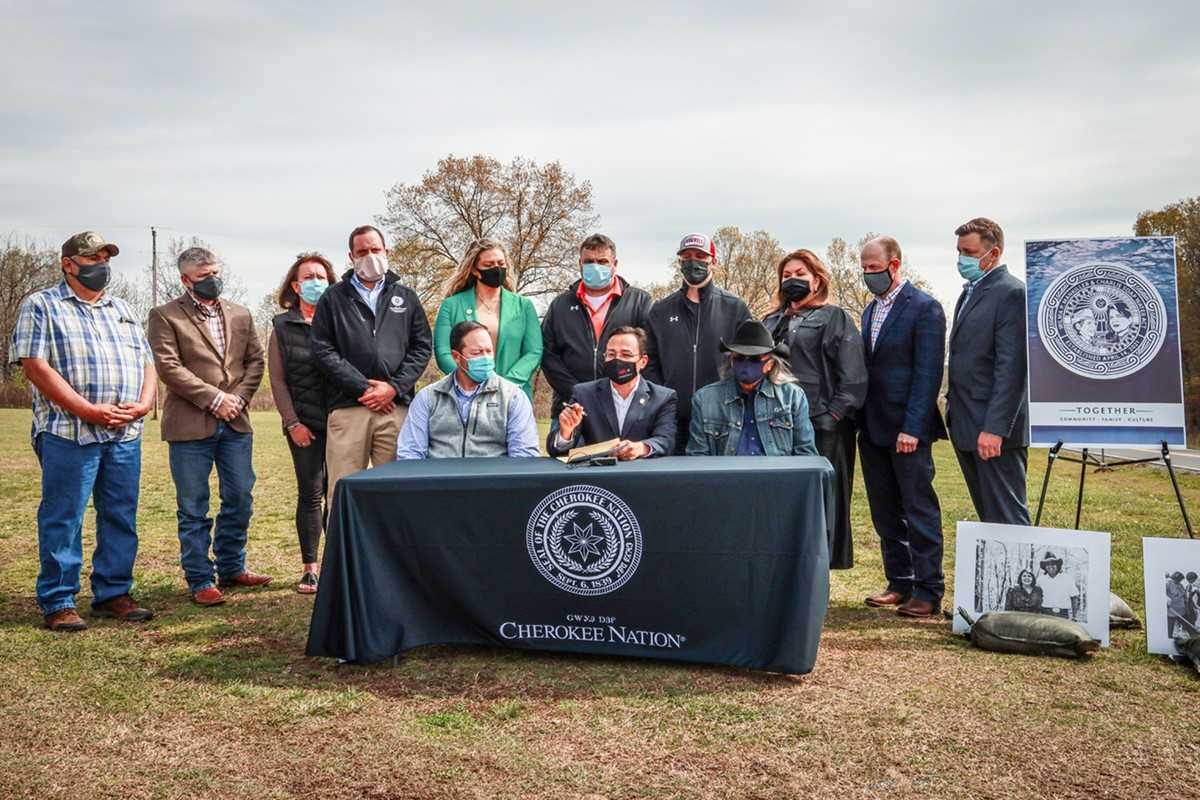BELL, Okla. — Cherokee Nation leaders gathered with community members in Bell on Wednesday to celebrate the official signing of the Wilma P. Mankiller and Charlie Soap Water Act, new legislation proposed by Principal Chief Chuck Hoskin Jr. and unanimously approved by the Council of the Cherokee Nation earlier this week.
The act will inject at least $2 million in additional funding each year into the Cherokee Nation’s efforts at eliminating barriers to clean water access in the reservation. The act will also develop expert recommendations and help find solutions to remedy any deficiencies that negatively impact the health, safety and overall quality of life of Cherokee citizens.
“The Wilma P. Mankiller and Charlie Soap Water Act is a move in the right direction to ensure that everyone on the Cherokee Nation Reservation will be free of any barriers to accessing clean, safe water,” Chief Hoskin said. “Addressing individual and community infrastructure needs is critical. Although the Cherokee Nation invests substantial funding every year into improving water systems in Cherokee communities, we must expand our efforts and continue studying, identifying, and addressing the issues of our water systems. The Wilma P. Mankiller and Charlie Soap Water Act allows us to do that not only by identifying Cherokee citizens who continue to struggle with access to clean water, but by also providing the additional funding we need to ensure access to quality water systems for our Cherokee communities.”
The act is named in honor of former Principal Chief Wilma P. Mankiller and former Executive Director of Community Service Charlie Soap, who worked to create and improve water access in communities now serviced by the Cherry Tree Rural Water District, including the historic Bell water line in Adair County. This year marks the 40th anniversary of the historic Bell water line project, which Mankiller and Soap began planning as community organizers under the administration of former Principal Chief Ross Swimmer in 1981.
“Each and every time I visit the community of Bell here in beautiful Adair County, I can’t help but to think about the legacy left by former Chief Mankiller and Mr. Charlie Soap,” said Deputy Chief Bryan Warner. “These two Cherokees rallied a community to come together as one and to do the hard work it took to build that water line. Today, I think this new legislation is going to honor their efforts and give us the resources to make sure no Cherokee is left without access to a safe supply of water here in the Cherokee Nation reservation.”
The new law will require the Cherokee Nation Department of Transportation and Infrastructure, formerly known as the Community Services department, to conduct biennial studies and identify Cherokees who lack access to water systems. The Department of Transportation and Infrastructure will develop a plan of action to provide access to each Cherokee citizen identified through the studies. It will also identify the number of Cherokee citizens within each county of the Cherokee Nation reservation whose access to water is limited to a well water supply, and develop long-term strategies to bring rural water access to as many Cherokee citizens as possible.
“I want to thank the administration, the Council and the people that made this possible. A lot of credit goes to many people,” Soap said. “Most of all I want to say thank you to the community people that came out and worked in the hot sun and the cold winter days to put this water line in place [40 years ago]. Not only did they complete it, but they set a precedent for other communities. It inspired the community, it inspired gadugi. That spirit is still alive, we just need to recognize it and call on the people. They’ll help. Everybody working together – gadugi – is what made this possible.”
Under the new law, Cherokee Nation will prioritize low-income applicants for individual assistance. It will also help remove some barriers to assisting individuals, such as issues with land title.
Funding for community water system projects will prioritize rural water systems based on infrastructure deficiencies.
“Since 2015, I bet I’ve received thousands of calls relating to issues that this act covers,” said District 8 Tribal Councilor Shawn Crittenden, lead sponsor of the act. “This really is huge. Simply working together, listening, realizing we all have the same goals, can really, really impact our people in a positive way, as this does. Having the Mankiller and Soap names attached makes it even better.”
The law will also require the tribe to specifically conduct a comprehensive infrastructure analysis of the Cherry Tree Rural Water District in Adair County, including recommendations and cost estimates for necessary improvements.
The minimum of $2 million of additional annual general-fund dollars called for in the act effectively doubles the amount Cherokee Nation spends from the tribe’s own revenues. Cherokee Nation also spends federal funds on individual and community water system projects. Chief Hoskin said he hopes to also leverage these additional tribal funds to bring millions more in federal funding to water projects.
“This legislation is such a big deal for not just Adair County, but for all of the Cherokee Nation reservation,” said District 7 Tribal Councilor Canaan Duncan. “Work has already begun in Adair County and I know it has in other places. I’m just super thankful to be a part of that for all of our constituents.”
Chief Hoskin signed the act into law near the Bell water tower and a portion of the historic Bell water line project constructed in southeast Adair County.

